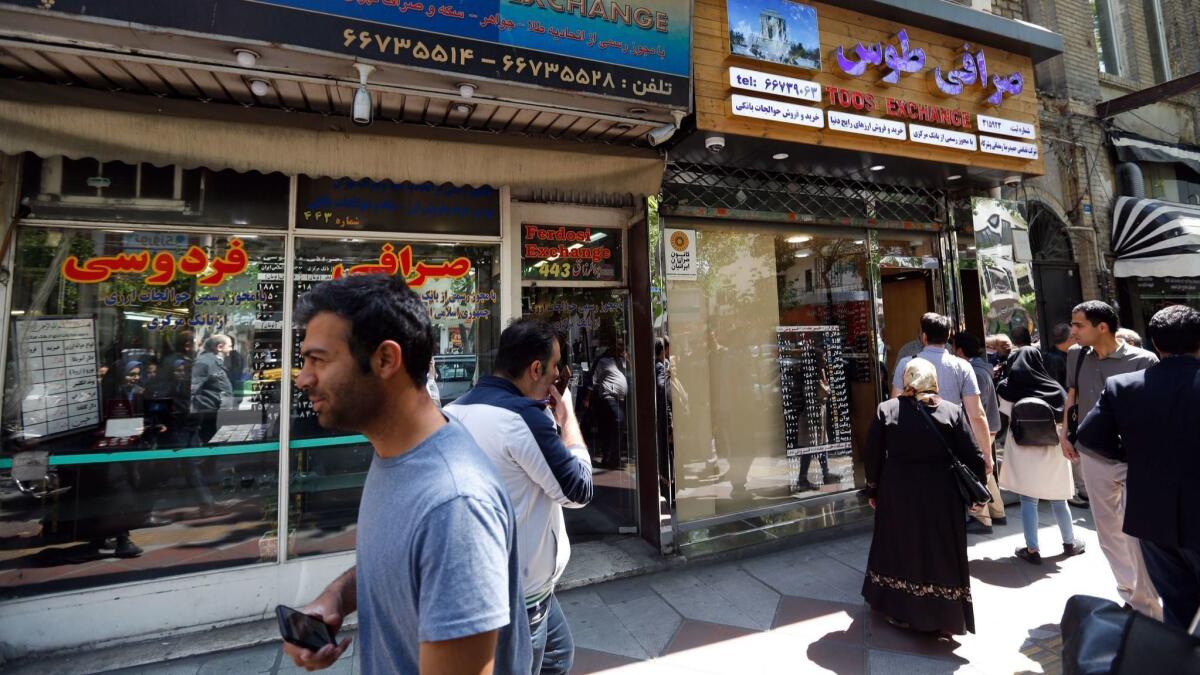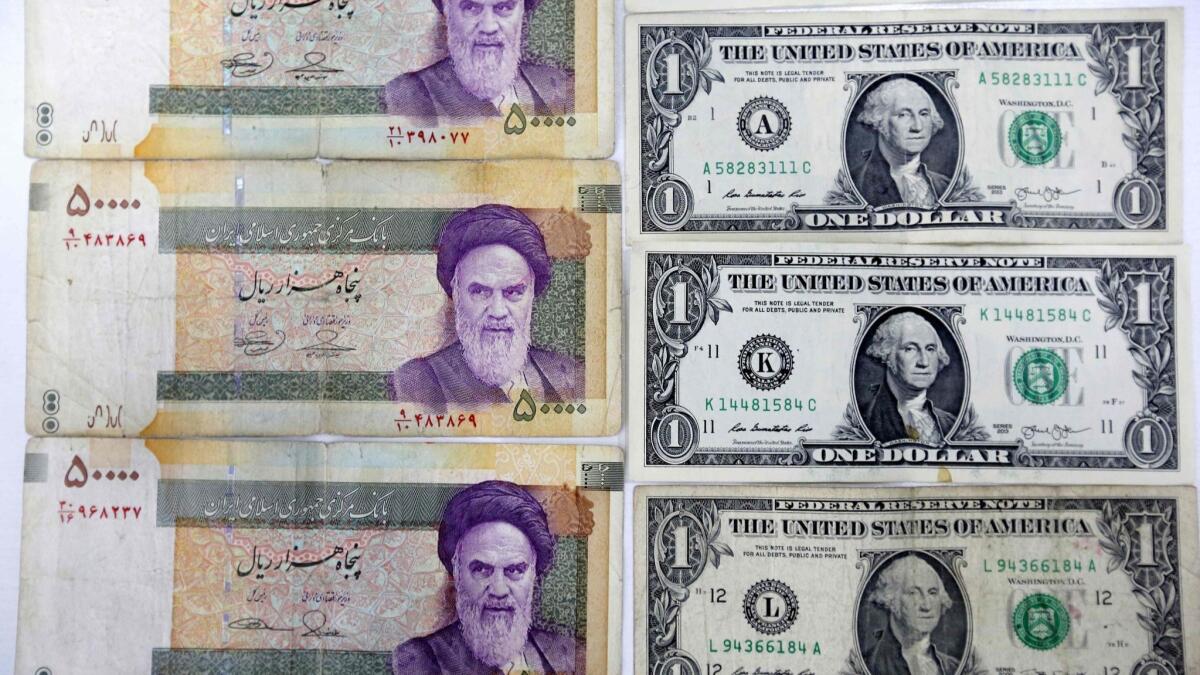The return of U.S. sanctions is expected to sow misery in Iran. But for those with money, there’s a haven: dollars

Reporting from Tehran — To gauge the likely impact of President Trump’s decision to breach the 2015 nuclear deal and re-impose U.S. sanctions on Iran, consider Mehdi Mohammadi’s iron beams.
An accountant for a company building new offices for Tehran’s municipal registrar, Mohammadi said that the beams used in construction are now three to four times costlier than a month ago, before Trump’s decision.
His company has laid off more than 20 employees in recent weeks, Mohammadi said, as Iranian businesses brace for further economic turmoil with the renewal of U.S. sanctions.
“That means more jobless — both educated and uneducated — will join the ranks of already unemployed people,” said Mohammadi, 35.
Economic analysts say the sanctions will spread misery across Iran’s economy — worsening inflation, accelerating the decline of the currency, making imports scarcer and making medicine, in particular, more difficult to acquire.
Under Trump’s decision, the U.S. will bring back nearly all of the sanctions it lifted following the 2015 agreement Iran signed to curtail its nuclear program and open it up to international inspectors. The first penalties will be imposed by early August, when Iran’s government, which dominates the domestic economy, will be prohibited from acquiring U.S. dollars or trading in steel and other industrial materials.
I am almost sure that for more than a decade we will have anarchy and maybe disintegration.
— Accountant Mehdi Mohammadi
As with the previous sanctions regime, these penalties are likely to hit working-class and low-income families the hardest, said Esfandyar Batmanghelidj, founder of Bourse & Bazaar, a publication that tracks Iran’s economy.
“If a recession hits and factories roll back production, especially those run in partnership with multinational companies barred from the market by U.S. sanctions, these blue-collar families also face the prospect of job losses,” Batmanghelidj said.
Wealthier families will also struggle but are better able to weather the storm, drawing on savings and sourcing some scarce goods — such as medication — from overseas, Batmanghelidj said.
The overall impact will be to exacerbate the deep economic inequalities that have fueled frustration with both the clerical establishment and the relatively moderate president, Hassan Rouhani. While Secretary of State Mike Pompeo has said the Trump administration is “looking for outcomes that benefit the Iranian people,” many Iranians say the sanctions will only hurt them.
“The administration’s policy is nothing but cynical,” Batmanghelidj said. “It punishes the Iranian people despite their government’s compliance with their nuclear deal commitments. The harm to families isn’t an unintended consequence — it is the only intended consequence in an otherwise schizophrenic Iran policy.”
Mohammadi, riding in a shared taxi through Tehran one recent evening, said while many Iranians were eager for political change, economic pressure will only bring more turmoil in the immediate future.
“On one hand, I wish that the big upheaval for overhauling the status quo would happen, but on the other hand, I am almost sure that for more than a decade we will have anarchy and maybe disintegration,” he said. “In the future, today’s dire economic situation could be enviable.”

Amid the uncertainty, many middle-class Iranians are withdrawing their savings from banks and buying dollars to guard against a further depreciation of the currency, the rial, which has fallen by more than 40% against the dollar since December and plunged to a record low in early May.
To stop the hoarding, which keeps cash from circulating in the economy, Iran has imposed a limit of about $12,000 on the amount of foreign currency that citizens can hold outside of banks.
But the rule is being widely flouted.
Ali Hasani, a 27-year-old florist, said he took the advice of his uncle, a former real estate contractor whose business has fallen on hard times, and last week converted as much of his savings as he could into dollars. He took the $20,000 and put it in a safe at home.
“Now I’m looking forward to another leap of the dollar against the rial,” he said.
Ebrahim Arab, a civil engineering contractor, withdrew all his deposits from credit unions — many of which have defaulted and left investors penniless — and put $30,000 in a safe.
“Hoarding dollars or euros saves our purchasing power, at least in the short term,” Arab said.
The government set an official price of 42,500 rials to the dollar, but the black market rate has risen to more than 64,000, according to Bonbast.com, which tracks the currency market. The money exchange shops that line the streets surrounding the British and German embassies are nearly all closed as vendors say they don’t have dollars to sell at the official rate.
Iranian officials say they are not panicking, partly because they have weathered tougher sanctions before, but also because they hope they can continue to sell oil to Asian and European countries. If those sales do not drop off sharply, and with oil at $70 a barrel, economists say Tehran can keep the government running and continue to pay the salaries of civil servants.
“We don’t even need European investment. We need to [continue to] be able to export 2 million barrels of crude oil a day,” said Saeed Laylaz, an economist close to Iranian moderates.
But without wholesale political change, economic frustration will keep mounting. A leftist economist, Fariborz Raisdana, said Iranian elites have found ways to exploit the sanctions to create wealth for well connected businessmen while the theocracy has neglected the needs of the working class.
“The ruling theocracy is not independent as it claims to be — it wants to collude to keep business with Europe,” Raisdana said.
“The current inflation and dollarization of [the] economy, hoarding hard currencies under pillows and the expected inflation in coming months make the rich richer and will create more shopping malls for the nouveau riche to go on shopping sprees. … I predict bad days for working-class people in Iran.”
Twitter: @SBengali
Special correspondent Mostaghim reported from Tehran and Times staff writer Bengali from Mumbai, India.
More to Read
Sign up for Essential California
The most important California stories and recommendations in your inbox every morning.
You may occasionally receive promotional content from the Los Angeles Times.











